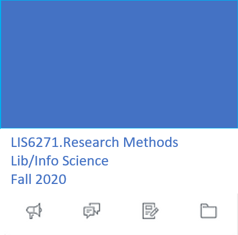Coursework (click on the course boxes below to read the course descriptions)
There are 7 required courses in the MLIS program:
LIS 5020 Foundations of Library & Information Sources (A)
LIS 6603 Basic Information Sources & Services (A)
LIS 6711 Organization of Knowledge I (A)
LIS 6409 Introduction to Library Administration (A)
LIS 6271 Research Methods in Library & Information Science (A)
LIS 6511 Collection Development & Maintenance (A)
Technology elective LIS 5268 IT Concepts (A)
And these were my 6 electives:
LIS 6445 Seminar in Public Libraries (A)
LIS 6946 Supervised Fieldwork/Internship at UWF (A)
LIS 6564 Materials for Children (A)
LIS 6303 Preparing Instructional Media (A)
LIS 6523 Adult Services in Libraries (A)
LIS 5937 Rare Books/Special Collections

Collection Development - Developmental approach to building library collections of both print and non-print materials. Emphasis upon evaluation, selection, and acquisition of library materials as they uphold the objectives of the institutions for which they are selected and acquired.

Adult Services in Libraries - Traditional and innovative services for adults in public and other types of libraries, including those for special groups, such as the aging, handicapped and institutionalized.

Preparing Instructional Media - Fundamentals of preparing and using audiovisuals as they relate to the communication process.

Materials for Children - Examination of materials for all institutions in which children are served: school media centers, public libraries, kindergartens, etc. Stress on selection aids, reviewing techniques, utilizations.

Supervised Fieldwork - Supervised experience in an approved cooperating library. Includes practice work, seminar sessions and individual conferences, a progress report, and a final report on the field experience.

Seminar in Public Libraries - Critical examination of public and institutional library administration, services, resources, and facilities at the municipal, county, and regional levels. Role of state and federal governments in library development.

Introduction to Library Administration - Behavioral approach to libraries as organizations; administrative principles, theories, and problems of all types of libraries; methods of administration; use of case studies, role plays, and in-basket exercises.

Research Methods in Library and Information Science - Overview of present status of research in library and information science; introduction to research methods and their application to librarianship; designed to prepare students to evaluate and plan research studies relating to library and information science.

Organization of Knowledge - Principles of the organization of knowledge emphasizing descriptive cataloging, including the MARC format, the use of LSCSH and the Library of Congress classification, and searching the OCLC Online Union Catalog.

Microcomputer Applications Library and Information Centers - Microcomputer hardware and software for libraries and their application in library/information settings. Projects using major applications for budgets, databases, and telecommunications are undertaken.

Foundations of Library and Information Science - This course provides an introduction to the study of library and information science, history; organization; specialized literature; outstanding leaders; current trends, issues, and problems; the place of the information agency in society with its contributions to that society.

Basic Information Sources and Services - An examination of the basic sources of information in the general library; of bibliographical control of all communication media, with emphasis on those tools of most value to general reference services.

Rare Books and Special Collections